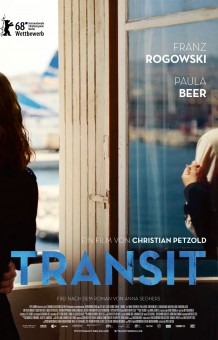Transit

World War II has been thoroughly examined throughout the history of cinema. The symbols and conventions of this genre are instantly recognisable: the swastika flags, the stiff, Nazi villains, the concentration camps. But what happens when a World War II film is stripped of these trademarks? Auteur Christian Petzold asks this question in his bold experiment Transit, a piece that attempts to connect the past with the present.
Based on Anna Seghers’ eponymous novel that details her real life escape from Nazi Europe, Petzold’s new feature removes the historical signifiers and transports these real life figures from the past to modern-day Marseille. Georg (Franz Rogowski) is a blank slate, a refugee looking to escape who ends up stealing the identity of a communist writer in an attempt to start over.
Transit‘s structure is scrambled and messy; it begins in Paris as the protagonist barely escapes the occupying forces. The film then becomes a family drama of Georg trying to become the father figure to young Driss (Lilien Batman). In this powerful episode, the German filmmaker connects the contemporary refugee crisis with that of the Jewish people in 1940.
This chapter is quickly abandoned as the romantic interest Marie (Paula Beer) is introduced, and so begins the noir-ish love triangle on which the piece lingers. Beyond the debut in Paris, the director loses the audience as it becomes impossible to connect with the characters through the dense layers of his experimentation. It’s as if a curtain falls down, exposing Petzold as he attempts to understand the results of his experiment.
All the while, a Kafkaesque melodrama plays out in the background as the characters revisit embassies and consulates in order to get a ticket to America. Poignantly, they never make it out of Marseille, destined to spend eternity as ghosts in purgatory.
The clumsy narration does little to add cohesion to the story: at times trying to impose significance to the preceding and, at others, exposing its artifice. This disconnect renders the engagement of the viewer almost impossible. Such a polarising, postmodern exercise will no doubt provoke a lot of discussion, but the film itself fails to stand on its own two feet.
Transit is an innovative gamble that births some brilliant ideas, but suffers from getting lost in a maze of its own making.
Sean Gallen
Transit does not have a UK release date yet.
Read more reviews from our Berlin Film Festival 2018 coverage here.
For further information about the event visit the Berlin Film Festival website here.


























Facebook
Twitter
Instagram
YouTube
RSS